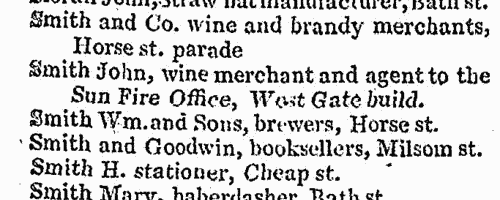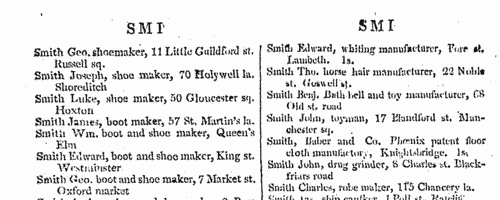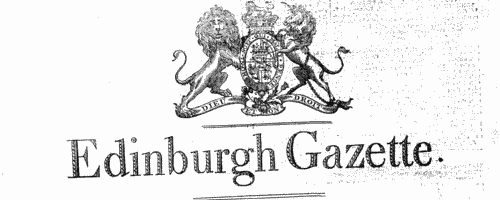Gullan Surname Ancestry ResultsOur indexes 1000-1999 include entries for the spelling 'gullan'. In the period you have requested, we have the following 36 records (displaying 1 to 10): Single Surname Subscription | | | Buying all 36 results of this search individually would cost £188.00. But you can have free access to all 36 records for a year, to view, to save and print, for £100. Save £88.00. More... |
These sample scans are from the original record. You will get scans of the full pages or articles where the surname you searched for has been found. Your web browser may prevent the sample windows from opening; in this case please change your browser settings to allow pop-up windows from this site. Scottish litigants, rebels and cautioners
(1585-1592)
The Privy Council of Scotland exercised a superior judicial authority in the kingdom, and consequently received and dealt with a constant stream of petitions, as well as dealing with the internal security of the state. This register of the council from 1 August 1585 to 31 July 1592, in the reign of king James VI, was edited by David Masson, and published under the direction of the Lord Clerk Register of Scotland in 1881. Some of the individuals mentioned are the complainants, those of whom they complained, and the sureties on both sides: at this period, some of the complainants are alleging serious attacks, often of a feuding nature. Many of the bonds entered into by the cautioners are promises to keep the peace towards such enemies. Failure to answer to the council when summoned was a serious contempt, leading to being denounced a rebel, with serious consequences. But 'horning' was also used in the pursuit of debts: there was no imprisonment for debt in Scotland, but a creditor could have an obstinate debtor ordered, in the sovereign's name, to pay what was due, failing which, the debtor could be put to the horn, denounced as a rebel, and imprisoned as a rebel. The main text (to page 774) is from the Acta Secreti Concilii, containing the minutes of the Privy Council, with intermixed Acta Proper (political edicts), Decreta (judicial decisions), Acta Cautionis (acts of caution) and Bands (registration of bonds). After that are printed some miscellaneous Privy Council documents from the same years: additional acts of caution (775-778); ordinances and acts anent the Borders and the North (779-814); and miscellaneous privy council papers (815-834). The sources most productive of names, the Acta Cautionis and Registration of Bands, are also the most repetitive in form, and are not transcribed verbatim and literatim: nevertheless, one of the editor's rules was for 'All proper names and names of places occurring in the originals to be preserved in the abstracts without exception, and in the exact original spelling.'
GULLAN. Cost: £4.00.  | Sample scan, click to enlarge

| Official Papers
(1700-1702)
The State Papers Domestic cover all manner of business relating to Britain, Ireland and the colonies, conducted in the office of the Secretary of State as well as other miscellaneous records. Includes lists of passes to travel abroad. This abstract covers the period from 1 April 1700 to 4 March 1702, with an appendix of items dating back as early as 1689.
GULLAN. Cost: £4.00.  | Sample scan, click to enlarge

|  Apprentices registered in Scotland
(1741-1745) Apprentices registered in Scotland
(1741-1745)
Apprenticeship indentures and clerks' articles were subject to a 6d or 12d per pound stamp duty: the registers of the payments usually give the master's trade, address, and occupation, and the apprentice's father's name and address, as well as details of the date and length of the apprenticeship. There are central registers for collections of the stamp duty in London, as well as returns from collectors in the provinces and from Scotland. The sums collected are recorded in Scottish money, with conversion to sterling for transfer to London. A Scottish pund was worth 20 English pence. (The sample entry shown on this scan is taken from a Norfolk return)GULLAN. Cost: £8.00.  | Sample scan, click to enlarge

|  Apprentices registered in Scotland
(1763) Apprentices registered in Scotland
(1763)
Apprenticeship indentures and clerks' articles were subject to a 6d or 12d per pound stamp duty: the registers of the payments usually give the master's trade, address, and occupation, and the apprentice's name, as well as details of the date and length of the apprenticeship. There are central registers for collections of the stamp duty in London, as well as returns from collectors in the provinces. These collectors generally received duty just from their own county, but sometimes from further afield. The indentures themselves can date from a year or two earlier than this return. (The sample entry shown on this scan is taken from a Durham return. Each entry has two scans, the other being the facing page with the details of the indenture, length of service, and payment of duty.) IR 1/55GULLAN. Cost: £8.00.  | Sample scan, click to enlarge

| Inhabitants of Edinburgh
(1805)
Holden's Triennial Directory of 1805 to 1807 included a provincial section, listing professional people and traders in England, Wales, Scotland and Ireland. (The sample scan here is from the listing for Bath)GULLAN. Cost: £6.00.  | Sample scan, click to enlarge

| Traders and professionals in London
(1805)
Holden's Triennial Directory for 1805 to 1807 includes this 'London Alphabet of Businesses, Professions, &c.': coverage is good; about 30,000 individuals are recorded.GULLAN. Cost: £4.00.  | Sample scan, click to enlarge

| Essex Freeholders: Barstable and Chafford hundreds
(1810)
The poll of the freeholders of Essex at the election of a knight of the shire to serve in Parliament, taken at Chelmsford 31 January 1810 and fourteen following days (Sundays excepted). The candidates were John Archer Houblon esquire and Montagu Burgoyne esquire. This poll book gives the names of the voters arranged by initial letter of surname division by division. The freeholders' full names are stated, surname first, residence (often elsewhere), and place where the freehold lay. The right hand column records their votes. The qualification for suffrage in the counties was the possession of a freehold estate worth more than 40s a year. The electoral divisions comprised these hundreds: I. Barstable and Chafford; II. Becontree and Waltham; III. Chelmsford; IV. Hinckford; V. Tendring; VI. Uttleford, Clavering and Dunmow; VII. Harlow, Ongar and Freshwell; VIII. Lexden, Colchester and Witham; IX. Rochford and Thurstable; X. Dengie and Winstree. Barstable hundred includes Billericay; Chafford hundred includes Brentwood and Greys Thurrock.
GULLAN. Cost: £6.00.  | Sample scan, click to enlarge

| Edinburgh Directory
(1819)
The Post-Office Annual Directory, from Whitsunday 1819 to Whitsunday 1820. Containing an alphabetical arrangement of the noblemen, private gentlemen, merchants, traders, and others, in the city and suburbs of Edinburgh, with their residence. Printed by John Pillans, published under the patronage of the Rt Hon the Earl of Caithness, Postmaster-General for Scotland.GULLAN. Cost: £4.00.  | Sample scan, click to enlarge

| Tradesmen and Professionals in Leith
(1819)
'An Alphabetical Arrangement of the Noblemen, Private Gentlemen, Merchants, Traders, and Others, with their Residence'. Full names are usually given, surname first, with address, including house number where appropriate.
GULLAN. Cost: £4.00.  | Sample scan, click to enlarge

| Scotland Bankrupts and Insolvents
(1820)
Official notices to creditors were published in the Edinburgh Gazette. This is the index to the bankrupts and insolvents. January to December 1820.GULLAN. Cost: £6.00.  | Sample scan, click to enlarge

|
Research your ancestry, family history, genealogy and one-name study by direct access to original records and archives indexed by surname.
|













